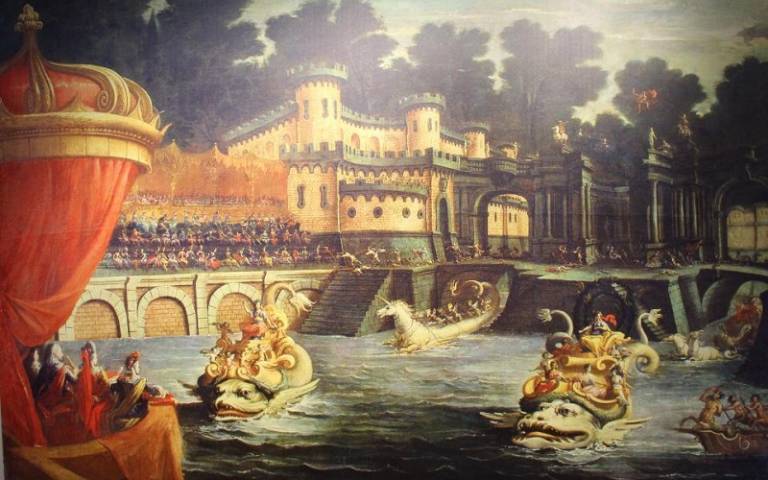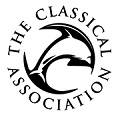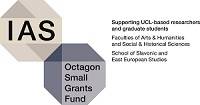Memory and Performance: Classical Reception in Early Modern Festivals
7 September 2022
Two stage hybrid conference and demonstration-performance: 13-14 October 2022, University of Parma and on Zoom; 23-24 February 2023, UCL and on Zoom.

Image: Pier Ilario Mercanti, 'Spolverini' (Parma 1657-Piacenza 1734), Carlo Virginio Draghi (Piacenza, 1638-1694) Naumachy in the Ducal Garden Palace in Parma. Oil on canvas, cm 264 × 330. Parma, Casa della Musica.
Two stage hybrid conference: 13-14 October 2022, University of Parma and on Zoom; 23-24 February 2023, UCL and on Zoom
Organisers: Francesca Bortoletti (UNIPR), Giovanna Di Martino (UCL & APGRD)
Scientific Committee: Mariella Bonvicini (UNIPR), Francesca Bortoletti (UNIPR), Nicola Catelli (UNIPR), Giovanna Di Martino (UCL), Giorgio Ieranò (UNITN), Fiona Macintosh (OXFORD), Massimo Magnani (UNIPR), Eckart Marchand (WARBURG), Lucy Jackson (DURHAM), Eugenio Refini (NYU); Paolo Russo (UNIPR), Margaret Shewring (WARWIK, SEFR), Carlo Varotti (UNIPR), Erika Valdivieso (YALE), Federica Veratelli (UNIPR).
Sponsors and Partners: Supported by the University of Parma, the W.I.D.E. Program, UNIPR, the Centro per le Attività e le Professioni delle Arti e dello Spettacolo (CAPAS, UNIPR), UCL, the Centre for Early Modern Exchanges (UCL), the Archive of Performances of Greek and Roman Drama (Oxford), the Leventis Foundation (UCL), the Institute of Classical Studies, the Classical Association and the Gilbert Murray Trust; in co-partnership with the Centro Interateneo sulla Memoria delle Arti Performative (MAP – Roma, Parma, Genova), the Centro Interuniversitario di ricerca di ‘Studi sulla Tradizione (Bari, San Marino, Padova, Trento), the Laboratorio Dionysos (Trento), The Society for European Festivals Research, The Warburg Institute (London) and UCL Institute of Advanced Studies.
Keynote speakers: Eugenio Refini (NYU) and Erika Valdivieso (Yale).
Both conferences will be preceded by three days of theatre workshops (10-12 October 2022; 20-22 February), organised as part of the W.I.D.E. program, promoted and supported by the University of Parma and the EU. These will be directed by the playwright and director Marco Martinelli (Teatro delle Albe) and by Giovanna Di Martino (UCL, APGRD), and offered to a group of 10 students from UNIPR, UCL, and Oxford. They will work on the performance of a number of scenes from a selection of early modern performance scripts based on ancient dramatic texts, and will investigate the performability and intricate web of citations embedded within early modern dramatic scripts. The results of these workshops will be presented at both conferences.
Call for papers (now closed)
Recent publications and research projects on early modern theatre have argued for a need to move away from strict definitions of theatrical endeavours as intrinsically linked to dramatic theatre to including as well as exploring the multiple forms of performance in early modern contexts. These were often explicitly tied with festive occasions and political celebrations, as well as cultural practises, and presented intangible, yet crucial, aspects of early modern life and memory. These transitory events – festivals – should be seen as the product of a highly performative context that extended beyond the vernacular dramatic traditions that were being formed between the 15th and the 18th centuries in some parts of the European and American continents. By means of music, poetry and drama, as well as the visual arts, these festive events and performances appropriated, reacted to, and enmeshed Greek and Roman mythologies as well as theatrical and textual material into local, national and new experimental practises, through which they gave voice to political tensions as well as documented transcultural exchanges across Europe, the Mediterranean and the Atlantic.
Similarly, recent research into the reception of Greek and Roman material in the early modern period has urged a reformulation of modern concepts encapsulating, and often limiting, possible methods of engagement with the ancient material. Studies in early modern translation, for example, have underscored the practical and conceptual importance of the receiving context in the translating process whilst moving away from a binary and uncreative understanding of this transaction between texts and cultures.
We believe the term ‘memory’ frees this transaction between cultures from superimposed prescriptions even further; in colonial contexts especially, the term ‘memory’ also allows an exploration of (un)conscious acts of (mis)remembering that undercut the cultural prestige of the Greek and Roman material that was being adapted.
But ‘memory’ is also apt for describing the very nature of theatrical performance; the effectiveness of thinking about theatrical endeavours in terms of their memorable-ness has evolved over the course of history, from antiquity to contemporary times. Exploring the conceptual and practical translations of ‘memory’ works particularly well in the early modern context, where the thick web of citations and re-elaborations of other cultures’ texts and material functioned as a basis for the creation of new collective, national or transnational memories.
Finally, ‘memory’ refers to another thematic strand which we aim at investigating in this conference: namely, the construction of these performance events as memories – i.e., the documentation and archiving of such memories by contemporary and future ‘archivists’, by past and present memory-holders.
The time frame chosen for this conference is from the 15th century up until the end of the 18th century. The geographical scope of the conference includes the European and American continents; however, proposals that reach beyond this geographical scope are also very welcome.
Potential topics may include, but need not be limited to:
- Performance culture in the early modern period and its associations with Greek and Roman material
- Traces of performance in the translation of Greek and Roman material
- Traces of translation of Greek and Roman material in performance scripts
- Courtly/commercial/academic theatre and how it reshapes and/or is connected with Greek and Roman material
- Greek, Roman and early modern mythologies in music festivals
- The relationship between and/or blending of Greek and Roman theatrical conventions and early modern forms of theatre and performance
- Performance of Greek and Roman material in order to form/validate/subvert new/old canons
- The presence of Aristotle in early modern performance and in theatre theories and practises
- The influence of Greek and Roman material on the creation of theatrical genres and/or the influence of early modern local/national/popular performance practises in the reshaping of Greek and Roman material
- Traces of Greek and Roman material in the early modern material and immaterial cultural heritage
- The archiving and documenting of performance events in the early modern period and now
- The construction/deconstruction of collective/national memories, past and present, through the archiving of performance events
All submissions should include: a 350-word abstract, a brief bio, and an email address. Please also specify whether you have a preference for the first stage of the conference, in Parma (13-14 October 2022), or the second one, in London (23-24 February 2023), and whether you prefer the online or the in-person option. Accepted languages for Parma: Italian and English; accepted language for London: English. The deadline for submissions has been extended to 30th May 2022; please send submissions to earlymodernfestival@outlook.com.
Selected Bibliography
- Bortoletti, F. (2021), I mestieri di Orfeo. Memoria, politica e teatro nel primo Rinascimento, Mimesis.
- Bortoletti, F. (2020), “Concordia principum: The Triumphal Entry of Prince Philip into Milan (1548)”, Charles V, Prince Philip, and the Politics of Succession Imperial Festivities in Mons and Hainault, 1549, ed. by M. McGowan e M. Shewring, London: Brepols.
- Burke, P., and Hsia, R. Po-chia (2007), Cultural Translation in Early Modern Europe, Cambridge University Press.
- Di Martino, G., Dudouyt, C., Bastin-Hammou, M., and Jackson, L. (eds.) (forthcoming 2022), Translating Greek Drama in the Early Modern Period: Theory and Practice in 14th-16th-century Europe, De Gruyter.
- Lin, E. (2014-2015), Seasonal Festivity and Commercial Performance in Early Modern England, Mellon.
- Mayne, E. (ed.) (2020), Rethinking Performance in Early Modern England: Sources, Context, and Forms, Special Issue in: Early Theatre vol. 23 n. 2.
- Mulryne, J.R. and Goldring E. (eds) (2002), Court Festivals of the European Renaissance: Art, Politics and Performance, Aldershot and Burlington VT: Ashgate.
- Plaisance M. (2008), Florence. Fêtes, spectacles et politique à l’époque de la Renaissance, Manziana.
- Refini, E. (2020), The Vernacular Aristotle: Translation as Reception in Mediaeval and Renaissance Italy, Cambridge, UK: Cambridge University Press.
- Ventrone, P. (ed.) (1992), Le tems revient 'l tempo si rinuova: feste e spettacoli nella Firenze di Lorenzo il Magnifico, Milano: Silvana.
 |  |  |  |  |  |
 Close
Close

